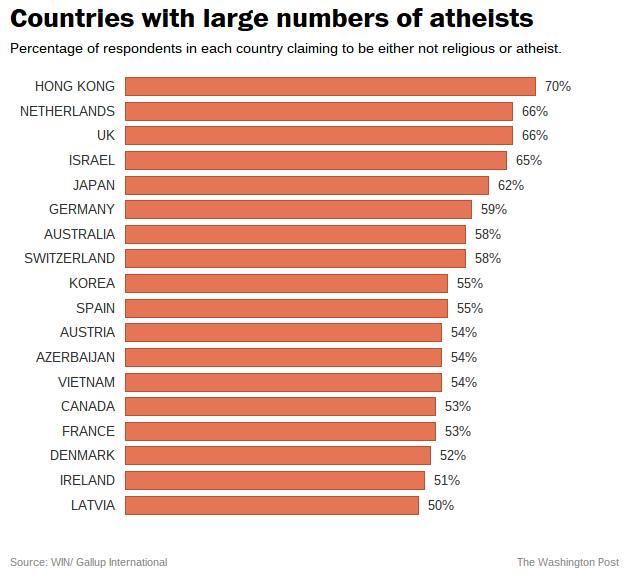The Least Religious Countries in the World

By:
As religion continues to play a large role in global issues — from conflicts, to action on climate change, to access to healthcare — it's interesting to examine which countries are (according to data) the least and most religious nations in the world.
The least religious nations.
After surveying 65 countries and 63,898 people, Gallup International and the World Independent Network (WIN) of Market Research found that China is the world's least religious nation. The 2015 study found that 90 percent of surveyed Chinese people consider themselves atheists or not religious at all. China was followed by Sweden and the Czech Republic in least religious countries:
 Washington Post via WIN/ Gallup International - washingtonpost.com
Washington Post via WIN/ Gallup International - washingtonpost.com
With 61 percent of self-proclaimed atheists, China has twice the amount of atheists as any other nation. China is followed by Hong Kong at 34 percent, Japan at 31 percent, the Czech Republic at 30 percent, and Spain at 20 percent.
For several decades, China has been run by the Communist Party of China, which is officially atheist and forbids members to hold religious views but "has grown more tolerant of religious activity over the past forty years," according to the Council on Foreign Relations. The party authorizes Buddhism, Taoism, Islam, Protestantism, and Catholicism as legal religions.
Other less religious and atheist countries.
In the WIN/Gallup survey, 65 percent of people in Israel identified themselves as atheists or non-religious. Though the Jewish religion is significant in Israel, many Jewish people in the country are secular.
RELATED: New Data Just Revealed How Many Young People Believe in God
 Washington Post via WIN/Gallup International Association - washingtonpost.com
Washington Post via WIN/Gallup International Association - washingtonpost.com
Religious areas of the world.
Unsurprisingly, the WIN/Gallup International survey found that more than half of Americans consider themselves religious. Africa and MENA (Middle East and North Africa) were found to be the most religious regions, while Thailand was considered the most religious country with 94 percent of respondents calling themselves religious. Armenia, Bangladesh, Georgia, Morocco, Fiji, and South Africa also had large numbers of people who identify as religious. A little more than a quarter of people in the U.K. consider themselves religious, and nearly two-thirds of Russians consider themselves religious.
Factors at play.
Overall, people under 34 were found to be more religious than older survey participants. When it comes to Americans, however, research has shown that lots of young people don't attend church or pray, even though their country is a major hub for religion.
Education also appeared to play a role in who was and wasn't found to be religious. The most religious people were less educated, but religious people remain "a majority in all educational levels," the paper reads.
Related: Millennial Views of Religious Institutions Dips Even More
"Income appears to exert a greater influence – among those with a medium high and high income, where less than 50 percent say they are religious, against 70 percent of those with low, medium low and medium income," the paper continues. "Likewise, the number of convinced atheists is as high as 22 percent and 25 percent among people with medium high and high income but only 6 percent and 5 percent among people with low and medium low income."
These findings are consistent with a 2015 survey conducted by the Pew Research Center, which found that people in poorer countries were more likely than people in richer countries to say religion plays an important role in their lives. Americans, however, were more likely than those in other economically advanced nations to say religion is very important to them.
 Flickr/Francesco Dazzi - flickr.com
Flickr/Francesco Dazzi - flickr.com
RELATED: NOT ALL MILLENNIALS ARE LOSING THEIR RELIGION
And the number of those who consider themselves religious may rise in the future. "[W]ith the trend of an increasingly religious youth globally, we can assume that the number of people who consider themselves religious will only continue to increase,” Jean-Marc Leger, president of Win/Gallup International Association, said in a release.
